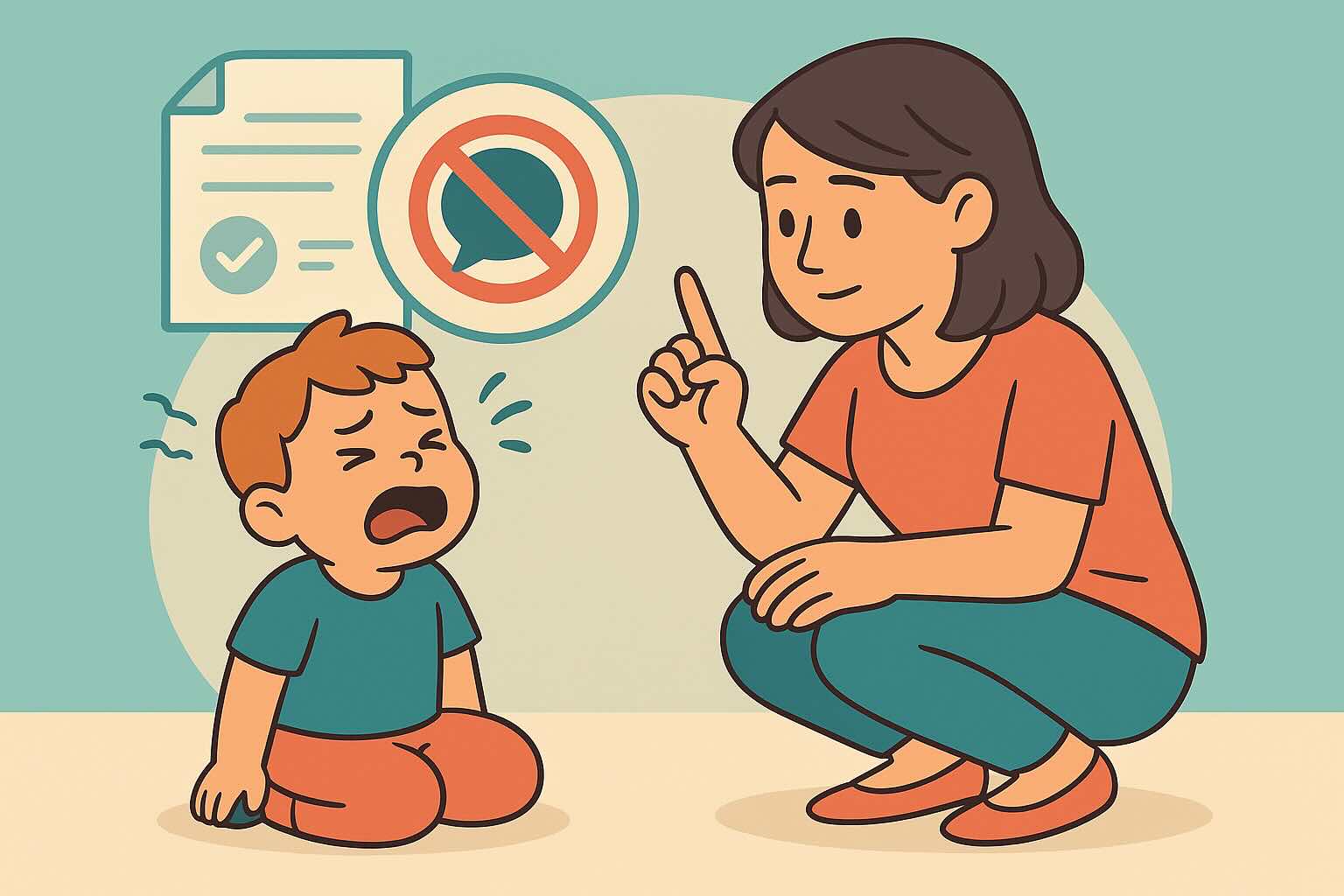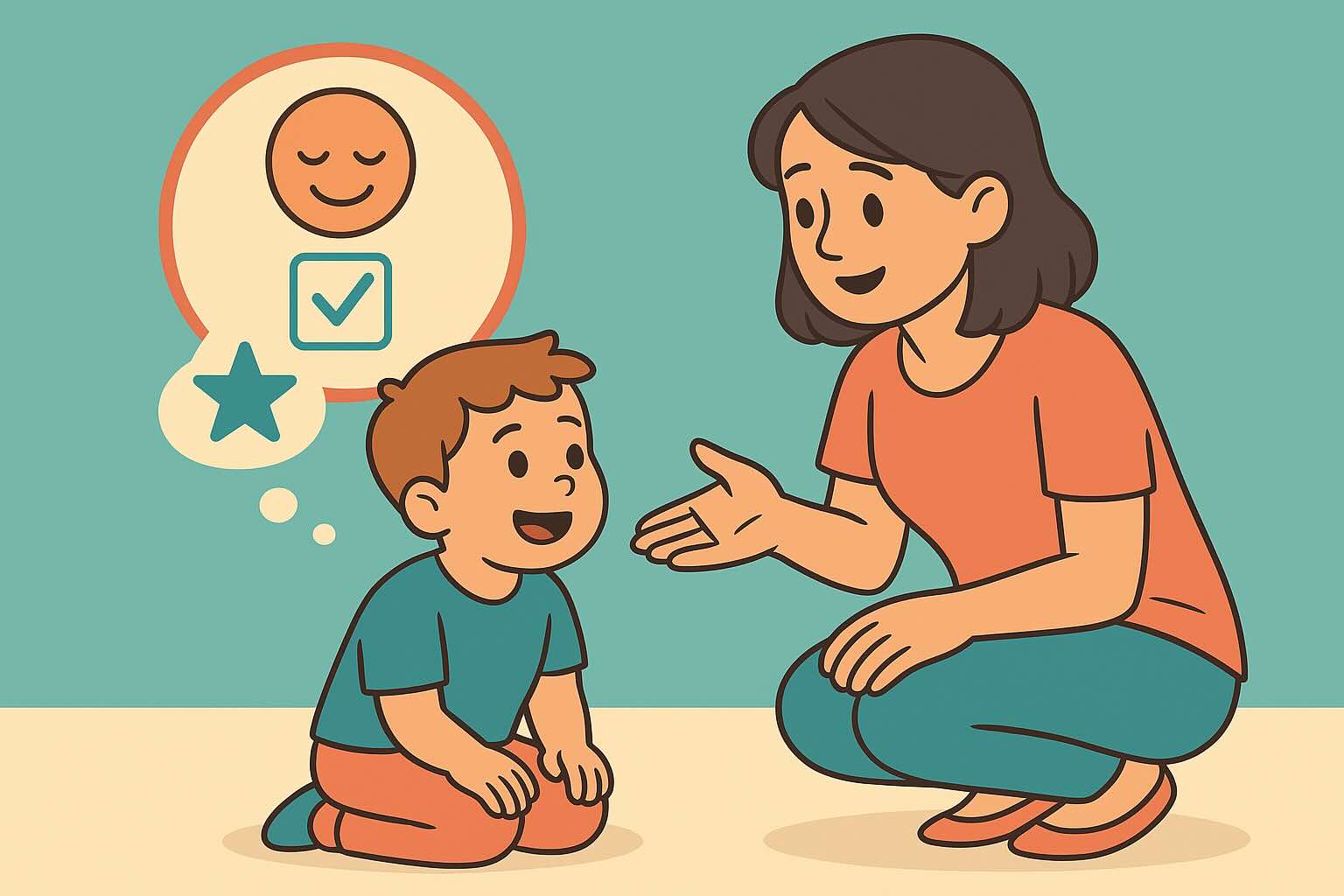How to Stop 6 Year Old Whining: 9 Techniques


If your 6-year-old has mastered the art of sophisticated whining - complete with logical arguments, emotional manipulation, and strategic timing - you're dealing with a child who combines advanced cognitive abilities with still-developing emotional regulation skills. Six-year-olds are capable of complex reasoning, social analysis, and deliberate influence attempts that make their whining both more challenging and more amenable to sophisticated intervention strategies.
Unlike younger children who whine primarily from overwhelm, 6-year-olds often whine strategically and purposefully. They understand adult psychology, can predict reactions, and may use whining as a deliberate tool to negotiate, avoid responsibilities, or gain special consideration. They're also navigating the complex academic and social world of elementary school, which can trigger both genuine stress and strategic communication attempts.
This comprehensive guide provides expert-level strategies specifically designed for 6-year-old developmental capabilities and challenges. With evidence-based approaches and realistic timelines, these methods work for 90% of families within 2-4 weeks. For foundational concepts, see our complete whining guide, and for addressing broader elementary behavior patterns, check our cooperative child development guide.
What You'll Learn in This Guide
- The 6-Year-Old Communication Profile - How elementary development creates sophisticated whining patterns
- Strategic vs. Emotional vs. Habitual Whining - Identifying different types and responding appropriately
- Expert-Level 3-C Method - Advanced responses for cognitively sophisticated children
- Academic and Social Pressure Impact - Addressing first-grade stress and peer relationship complexities
- Complex Emotional Intelligence - Building advanced communication and self-awareness skills
- Sophisticated Manipulation Techniques - Handling advanced guilt-inducing and bargaining behaviors
- Prevention Through Development - Meeting elementary-age needs to reduce whining triggers
- Long-term Communication Foundation - Building skills that support adolescent relationships
Estimated reading time: 17 minutes
Understanding the 6-Year-Old Communication Mind
The Elementary School Transformation
Advanced cognitive development impacting communication:
Concrete operational thinking emergence:
- Understanding logical rules, cause-and-effect relationships, and systematic problem-solving
- Ability to plan multi-step strategies and predict outcomes of different approaches
- Sophisticated understanding of social hierarchies, fairness concepts, and rule systems
- Beginning to grasp abstract concepts like reputation, loyalty, and social expectations
Emotional sophistication:
- Processing complex, layered emotions while still lacking full regulation capabilities
- Understanding that emotions can be used strategically to influence others' decisions
- Experiencing academic and social pressures that create new categories of stress
- Developing emotional self-awareness while still needing significant support and guidance
Social complexity navigation:
- Managing intricate peer relationships involving inclusion, exclusion, and social status
- Understanding different social contexts require different communication approaches
- Comparing family dynamics, rules, and responses to those of multiple other families
- Beginning to understand concepts like peer pressure, social conformity, and group dynamics
Communication advancement:
- Sophisticated vocabulary for describing complex situations, emotions, and abstract concepts
- Ability to construct compelling arguments, present logical cases, and engage in debate
- Understanding of persuasion techniques, emotional appeals, and strategic communication timing
- Recognition of how different communication styles affect different people in various situations
The First Grade Academic and Social Pressure Effect
Why elementary school intensifies whining patterns:
Academic performance pressure:
- Formal assessments, grades, and performance comparisons with peers
- Increased homework expectations and independent work requirements
- Processing feedback about academic strengths, weaknesses, and learning differences
- Managing perfectionist tendencies and performance anxiety in structured environments
Complex social navigation:
- Intricate friendship dynamics involving loyalty, betrayal, inclusion, and exclusion
- Understanding peer group hierarchies and social status within classroom dynamics
- Managing conflicts with friends, teachers, and classmates in more sophisticated ways
- Processing social feedback about personality, behavior, and social skills from multiple sources
Independence and responsibility expectations:
- Balancing increased autonomy expectations with still-present dependency needs
- Managing different behavioral expectations between home, school, and peer environments
- Processing conflicting messages about appropriate emotional expression in various settings
- Navigating authority relationships with multiple teachers and adult figures
Sophisticated Types of 6-Year-Old Whining
Strategic academic whining:
- "This homework is impossible and you never help me enough"
- Designed to get parents to do work for them or reduce academic expectations
- Often includes dramatic language about academic capabilities or teacher unfairness
- May involve sophisticated arguments about why assignments are unreasonable or too difficult
Social manipulation whining:
- "Everyone thinks I'm weird because you won't let me have/do [thing]"
- Uses peer pressure and social comparison to influence parental decisions
- Often involves detailed descriptions of what other children have or are allowed to do
- May include threats about social consequences or exclusion if parents don't comply
Emotional manipulation whining:
- "You care more about rules than about my happiness"
- Sophisticated guilt-inducing language designed to make parents doubt their decisions
- Often includes psychological insights about family dynamics or parental motivations
- May involve threats to withdraw affection or claims about parental love being conditional
Justice and fairness whining:
- "It's not fair that I have to follow this rule when [sibling/friend] doesn't"
- Involves complex arguments about equality, fairness, and logical consistency
- Often includes detailed analysis of family rule systems and perceived inconsistencies
- May involve sophisticated understanding of legal or moral concepts
Perfectionist anxiety whining:
- "I can't do this because I might make a mistake and then everyone will think I'm stupid"
- Reflects genuine anxiety about performance and social judgment
- Often involves catastrophic thinking about consequences of imperfection
- May include sophisticated understanding of social evaluation and academic competition
Expert-Level 3-C Method for 6-Year-Olds
The foundational approach requires significant sophistication for elementary-age cognitive and emotional complexity.
C #1: Stay Calm (Advanced Emotional Leadership)
Why calm is crucial with sophisticated strategic minds: Six-year-olds are studying adult emotional regulation as a model for their own development while simultaneously testing whether emotional expression can influence adult decision-making. Your calm response demonstrates emotional maturity while teaching that manipulation is ineffective.
Expert-level calm strategies:
- Cognitive sophistication: "This is advanced skill-building, not a power struggle"
- Emotional preparation: Anticipate sophisticated manipulation attempts and prepare measured responses
- Physiological mastery: Maintain stable breathing, voice tone, and body language regardless of provocation
- Perspective maintenance: Remember their developmental appropriateness while maintaining high expectations
What your calm communicates to sophisticated minds:
- Adult decisions are made thoughtfully, not reactively based on children's emotional expression
- Emotional regulation is possible even during complex, challenging interactions
- Whining and manipulation don't create emotional chaos or changed outcomes
- Family stability exists independently of children's approval or emotional comfort
C #2: Stay Composed (Sophisticated Measured Responses)
Why composed responses matter more with strategic 6-year-olds: Six-year-olds can read micro-expressions, interpret subtle voice changes, and detect hesitation or uncertainty in adult responses. They're analyzing your reactions for evidence that their sophisticated whining strategies might eventually succeed.
Expert composed responses:
- Neutral acknowledgment: "I hear whining" (without emotional reactivity or engagement)
- Clear expectation: "Use your regular voice" (firm, calm, non-negotiable)
- Strategic pauses: Allow processing time while maintaining confident body language
- Consistent demeanor: Maintain the same energy regardless of whining sophistication or intensity
Avoid these responses that encourage strategic sophistication:
- "You're too smart to be acting like this" (implies intelligence should eliminate whining)
- "I don't have time for these games" (suggests whining is about timing or attention)
- "Fine, you win this time" (teaches that sophisticated persistence eventually succeeds)
- Engaging in debates about the logic or fairness of their whining arguments
C #3: Stay Consistent (Unshakeable Boundaries)
Why consistency is absolutely critical with analytical minds: Six-year-olds are sophisticated enough to conduct complex, long-term experiments on family systems. They remember what worked in different circumstances, analyze patterns across family members, and may test consistency across extended periods to find exceptions or weaknesses.
Expert consistency requirements:
- Identical responses: Use exact same language regardless of whining sophistication, emotional intensity, or strategic appeal
- Cross-contextual application: Same expectations whether child is stressed, overwhelmed, tired, or upset
- Universal application: All family members and caregivers must respond identically
- No negotiation policy: Consistency during your difficult days, their difficult days, and extraordinary circumstances
Building unshakeable consistency:
- Document exact response scripts and practice until automatic
- Discuss sophisticated manipulation attempts with all caregivers in advance
- Plan responses for complex scenarios before they arise
- Review and reinforce approach weekly to maintain alignment
Expert Response Protocol for 6-Year-Old Whining
Phase 1: The Advanced Communication Discussion
Six-year-olds can engage in sophisticated conversations about communication effectiveness, relationship dynamics, and social skills.
Step 1: Acknowledge Their Cognitive Development "Now that you're six and in first grade, you're old enough to understand some complex things about communication, relationships, and how people respond to different ways of expressing feelings and needs."
Step 2: Analyze Communication Effectiveness "I've noticed you've been using whining and dramatic language to try to get what you want. You're really intelligent, and you've probably noticed that sometimes this gets big reactions from adults. Let's talk about whether this strategy actually works well for you."
Step 3: Connect to Social and Academic Success "Think about your friendships, your relationship with your teacher, and how you want people to see you. When someone whines at you, how does it make you feel about them? Do you want to help them more or less? The same thing happens when you whine at others."
Step 4: Set Advanced Expectations "You have the ability to express even very complicated, frustrating, or disappointing feelings using clear, respectful communication. This is an important life skill that will help you succeed in school, friendships, and throughout your life."
Step 5: Collaborative Strategy Development "Let's work together to develop strategies you can use when you notice yourself feeling like whining. What are some things you could do instead?"
Phase 2: Expert In-the-Moment Response Protocol
Level 1: Expectation Reminder "I hear whining. You know what to do."
Level 2: Brief Redirection (If Level 1 Insufficient) "Regular voice."
Level 3: Specific Guidance (If Needed) "Tell me clearly: 'I'm frustrated about [specific situation].'"
Level 4: Boundary Setting with Consequence "I'm ready to help with this situation when you can communicate about it clearly. Take your time."
Level 5: Natural Consequence Implementation "I can see you're having difficulty using clear communication right now. Let me know when you're ready to try again, and we can address this together."
Phase 3: Expert Scenario Management
Scenario 1: Complex Academic Manipulation Child whines: "This homework is way too hard for someone my age and you're being mean by making me do it when you could just help me get it done faster!"
Your response: "I hear whining and attempts to avoid homework responsibility. Use your regular voice to tell me what specific part is challenging, and we'll work on building your skills."
Scenario 2: Sophisticated Social Pressure Child whines: "Everyone in my class thinks I'm weird because I'm the only one who can't have TikTok and now nobody wants to be my friend!"
Your response: "I hear whining about social concerns. Social situations can feel really important. Use your regular voice to tell me about your friendships, and we can talk about how to handle social differences."
Scenario 3: Advanced Emotional Manipulation Child whines: "You obviously care more about being right than about making me happy, and that's why I'm always sad at our house!"
Your response: "I hear whining and attempts to make me feel guilty about parenting decisions. I care about your happiness AND about what's best for you long-term. You can say 'I disagree with this decision' in your regular voice."
Scenario 4: Complex Fairness Arguments Child whines: "This rule doesn't make logical sense because if the point is safety, then why can I do [thing] but not [other thing]? It's totally inconsistent!"
Your response: "I hear whining disguised as logical argument. You disagree with this rule. You can say 'I don't understand why this rule is necessary' in your regular voice, and we can discuss it."
Advanced Academic and Social Pressure Management
Understanding First Grade Stress Impact
Why academic pressure triggers sophisticated whining:
Performance anxiety development:
- Formal assessment and grading creating new categories of success and failure
- Comparison with peers revealing academic strengths and challenges
- Teacher feedback affecting self-concept and confidence
- Homework expectations requiring sustained attention and effort
Social complexity stress:
- Navigating friendship dynamics involving loyalty, betrayal, and group membership
- Understanding peer hierarchies and social status within classroom environments
- Managing conflicts with multiple peers simultaneously
- Processing exclusion, inclusion, and social judgment from various sources
Addressing Academic-Related Whining
Performance anxiety whining: When child whines about academic challenges, tests, or homework:
"I hear whining about school work. Academic challenges can feel overwhelming sometimes. Use your regular voice to tell me specifically what feels difficult, and let's break it down together."
Follow-up strategies:
- Break overwhelming tasks into manageable components
- Teach study skills and organization strategies
- Communicate with teacher about learning needs and appropriate support
- Address perfectionist thinking and performance anxiety directly
Teacher relationship whining: When child whines about teacher expectations, feedback, or discipline:
"I hear whining about your teacher. Sometimes school authority figures feel different than family. Use your regular voice to tell me what happened, and we can talk about how to handle it."
Follow-up strategies:
- Validate their feelings while supporting teacher authority
- Teach appropriate ways to advocate for themselves at school
- Coordinate with teacher if genuine concerns exist
- Help them understand different relationship dynamics in various settings
Peer academic comparison whining: When child whines about others' academic performance or abilities:
"I hear whining about academic comparisons. Everyone has different strengths and challenges. Use your regular voice to tell me how you're feeling about your own learning."
Follow-up strategies:
- Focus on personal growth rather than peer comparison
- Celebrate individual progress and effort
- Address competitive feelings and social comparison anxiety
- Build confidence in their unique strengths and abilities
Managing Complex Social Relationship Whining
Friendship conflict whining: When child whines about peer relationships, exclusion, or social challenges:
"I hear whining about friend problems. Friend situations can feel really big and complicated. Use your regular voice to tell me what happened, and we can problem-solve together."
Follow-up strategies:
- Teach conflict resolution and social problem-solving skills
- Role-play different approaches to social challenges
- Build confidence in their social abilities and worth
- Address any bullying or serious social concerns with school
Social pressure and comparison whining: When child whines about what other families allow or what peers have:
"I hear whining about differences between families. Every family makes different choices based on their values. Use your regular voice to tell me what you're hoping for, and we can discuss our family's reasoning."
Follow-up strategies:
- Explain family values and decision-making processes
- Help them understand that different doesn't mean wrong
- Build pride in family identity and choices
- Teach them how to handle peer pressure and social differences
Building Expert-Level Emotional Intelligence
Teaching Complex Emotional Concepts
Advanced emotional vocabulary for 6-year-olds: Six-year-olds can understand sophisticated emotional concepts and learn precise emotional language.
Expert-level feeling words:
- Overwhelmed: "I have more things to handle than I feel capable of managing"
- Anxious: "I'm worried about something that might happen in the future"
- Frustrated: "I want to accomplish something but I'm encountering obstacles"
- Disappointed: "Something didn't turn out the way I hoped or expected"
- Embarrassed: "I feel uncomfortable about what others might think of me"
- Confident: "I feel sure about my abilities and decisions"
- Guilty: "I feel bad about something I did that I think was wrong"
- Relieved: "I feel better because something I was worried about is resolved"
- Jealous: "I want something someone else has and I feel bad that I don't have it"
- Proud: "I feel good about something I accomplished or a choice I made"
Teaching Emotional Complexity and Nuance
Multiple emotions simultaneously: "You can feel excited about the school play AND nervous about remembering your lines. Both feelings can be true at the same time."
Emotional intensity variations: "This seems like medium-level frustration about your math homework, not huge, overwhelming frustration. Can you tell the difference?"
Emotional temporariness: "This disappointed feeling about not being invited to the party will feel less intense tomorrow and much less intense next week."
Appropriate emotional expression: "It's completely normal to feel angry when someone is unfair to you. AND there are helpful and unhelpful ways to express that anger."
Advanced Problem-Solving vs. Emotional Support
Teaching sophisticated distinction: Six-year-olds can learn when they need practical problem-solving vs. emotional support and validation.
Problem-solving communication: "I'm struggling with this long division problem and I can't figure out where I'm making mistakes. Can you help me understand the steps?"
Emotional support communication: "I'm feeling really sad that Maya didn't want to play with me at recess today. I just need someone to understand how disappointing that feels."
Your differentiated responses:
- For problem-solving: "Let's work through this step by step"
- For emotional support: "That does sound really disappointing. Tell me more about how that felt."
Prevention Strategies for Elementary-Age Children
Meeting Advanced Developmental Needs
Intellectual stimulation and challenge: Six-year-olds need appropriate mental challenges that match their growing cognitive abilities.
Practical applications:
- Provide age-appropriate puzzles, strategy games, and brain teasers
- Include them in complex household problem-solving and decision-making
- Offer opportunities for creative expression and independent projects
- Engage them in sophisticated conversations about their interests and observations
Competence and mastery: Elementary-age children need opportunities to develop expertise and feel capable.
Building advanced competence:
- Teach life skills that match their developmental capabilities
- Provide opportunities for leadership and helping others
- Celebrate their growing independence and responsibility
- Acknowledge their problem-solving attempts and creative solutions
Autonomy within structure: Six-year-olds need significant independence within clear, consistent boundaries.
Advanced autonomy practices:
- Include them in family decision-making when appropriate
- Allow them to make meaningful choices about their activities, friendships, and interests
- Respect their developing opinions and preferences
- Teach them to advocate appropriately for their needs and wants
Advanced School Success Support
Academic confidence building:
- Focus on effort, improvement, and learning process rather than just outcomes
- Help them understand that struggle and mistakes are normal parts of learning
- Build specific academic skills through practice and support
- Coordinate with teachers about learning needs and appropriate challenges
Social skill development:
- Teach sophisticated conflict resolution and friendship skills
- Practice social scenarios through discussion and role-play
- Help them understand social dynamics and peer relationships
- Support their developing social identity and group membership
Stress management and emotional regulation:
- Teach age-appropriate stress management techniques
- Help them recognize and respond to their emotional states
- Build routines that support emotional regulation and recovery
- Provide emotional safety and support during challenging periods
Handling Expert-Level Manipulation Attempts
Advanced Guilt-Inducing Strategies
When 6-year-olds use sophisticated emotional manipulation:
Child: "I can tell you don't really love me as much as you love [sibling] because you're always nicer to them about everything." Your response: "I love you and [sibling] equally, and I make different decisions for different children based on their individual needs. You can say 'I want you to be more understanding about this situation' without trying to make me feel bad about loving you."
Child: "Everyone at school is going to think I have mean parents if you don't let me do this, and then they won't want to come to our house anymore." Your response: "You're worried about what your friends will think about our family rules. You can say 'I'm concerned about what my friends will think' without trying to convince me to change our rules based on other people's opinions."
Child: "Fine, I guess I'll just never try to talk to you about important things again since you obviously don't care what I think." Your response: "I care very much about what you think and feel. I make decisions based on what's best for you, not based on whether you agree with them. You can say 'I disagree with your decision' without threatening to stop communicating with me."
Teaching Advanced Advocacy vs. Manipulation
Appropriate advocacy skills: "If you disagree with a family rule or decision, here's how you can advocate for yourself appropriately: [teach specific skills]"
Inappropriate manipulation tactics: "Trying to make people feel guilty, comparing our family to others, or threatening to withdraw your love are not effective ways to get what you want and they damage relationships."
Building relationship-based influence: "The best way to influence people is through honest communication, demonstrating responsibility, and building trust over time."
Realistic Timeline for 6-Year-Old Mastery
Week 1-2: Advanced Strategy Testing
What to expect:
- Sophisticated resistance including complex logical arguments and emotional appeals
- Testing boundaries with advanced manipulation techniques
- Possible escalation in whining sophistication as simpler methods prove ineffective
- Strategic timing of whining attempts when they think you might be more likely to give in
- Some genuine confusion about new expectations versus previously effective strategies
Your goals:
- Maintain absolute consistency despite sophisticated resistance and logical arguments
- Stay calm during complex emotional manipulation attempts
- Address advanced manipulation directly without becoming defensive or taking emotional bait
- Continue teaching sophisticated communication skills during calm, connected moments
- Begin documenting specific triggers, patterns, and most effective response strategies
Success markers:
- Child can engage in complex conversations about communication and relationship dynamics
- Occasional success with switching to appropriate communication when reminded
- Beginning understanding that sophisticated manipulation is no more effective than simple whining
Week 2-4: Integration and Mastery
What to expect:
- Rapid improvement in communication choices once they understand expectations are firm
- Advanced self-awareness and self-correction abilities
- Better emotional regulation and sophisticated emotional expression
- Decreased frequency of manipulation attempts as they prove consistently ineffective
- Improved cooperation with communication expectations and family harmony
Your goals:
- Move to minimal prompts as they demonstrate understanding and capability
- Celebrate sophisticated communication improvements and emotional growth
- Address any remaining challenging situations with continued consistency
- Build advanced emotional intelligence and social communication skills
- Continue supporting academic and social success while maintaining communication expectations
Success markers:
- Child demonstrates advanced self-correction and emotional awareness
- Regular voice becomes strongly preferred communication method
- Sophisticated emotional expression replaces dramatic whining
- Better overall emotional regulation and family cooperation
Troubleshooting Expert-Level Challenges
When Academic Pressure Triggers Regression
High-stakes situations that may trigger whining:
- Important tests or academic assessments
- Challenging homework assignments or projects
- Academic competitions or performances
- Teacher conferences or academic feedback
Your response: Provide support while maintaining communication expectations: "I can see you're feeling a lot of pressure about this test. That's understandable - tests can feel scary. AND we still use our regular voices to talk about our concerns. Use your clear voice to tell me what you're worried about, and we can make a plan."
Managing Perfectionism and Performance Anxiety
When whining stems from perfectionist concerns: "I hear whining about wanting to do everything perfectly. Perfectionism can feel really stressful. Use your regular voice to tell me what you're concerned about, and we can talk about handling mistakes and learning."
Follow-up strategies:
- Teach that mistakes are essential for learning and growth
- Model your own mistake-making and recovery processes
- Focus on effort, improvement, and learning rather than perfect performance
- Build tolerance for imperfection and comfort with challenge
Addressing Social Complexity and Peer Pressure
When whining involves complex social manipulation: "I hear whining about social situations. Friend relationships can feel really complicated at your age. Use your regular voice to tell me what's happening socially, and we can talk about how to handle peer pressure and friendship challenges."
Building social confidence:
- Teach sophisticated social skills and conflict resolution
- Help them understand healthy vs. unhealthy friendship dynamics
- Build confidence in their social worth independent of peer approval
- Support their developing social identity and authentic self-expression
Building Long-Term Communication Excellence
Connecting Communication to Life Success
Academic success connection: "The clear, sophisticated communication skills you're learning will help you succeed throughout school. Teachers appreciate students who can express their needs clearly and work through challenges respectfully."
Social success connection: "Friends and peers are drawn to people who can communicate honestly about their feelings without drama or manipulation. These skills will help you build strong, lasting friendships."
Future preparation: "Learning to express complex emotions clearly and advocate for yourself appropriately are skills you'll use throughout your life in relationships, school, work, and all areas of personal success."
Building Advanced Emotional and Social Intelligence
Sophisticated self-awareness:
- Help them recognize their emotional patterns and triggers
- Teach them to identify their communication choices and their effects on others
- Build awareness of their impact on family dynamics and relationships
- Celebrate their growing emotional maturity and sophisticated thinking
Advanced relationship skills:
- Teach empathy and perspective-taking in complex social situations
- Help them understand different communication styles and preferences
- Build skills in reading social cues and adapting communication accordingly
- Support their developing understanding of healthy relationship dynamics
Your 6-Year-Old Excellence Action Plan
Daily Practices
- ✅ Respond consistently to all whining with calm, expert-level redirection
- ✅ Celebrate sophisticated communication when they express complex emotions clearly and appropriately
- ✅ Model advanced emotional intelligence in your own daily interactions and family communication
- ✅ Address manipulation attempts directly without becoming defensive or engaging in power struggles
- ✅ Provide academic and social support while maintaining clear communication expectations
Weekly Practices
- ✅ Practice advanced emotional vocabulary through books, real situations, and sophisticated conversations
- ✅ Discuss family values and communication expectations at an age-appropriate sophisticated level
- ✅ Coordinate with school about behavioral expectations, academic progress, and any communication concerns
- ✅ Review challenging situations and problem-solve better responses collaboratively
- ✅ Build emotional and social intelligence through complex emotion recognition, social skill practice, and relationship discussion
Monthly Review
- ✅ Track communication improvements and reduced whining frequency across all settings
- ✅ Assess academic and social adjustment and emotional development progress
- ✅ Adjust strategies based on developmental changes and what's proving most effective
- ✅ Celebrate growth in emotional maturity, communication sophistication, and social competence
- ✅ Plan for upcoming challenges like academic pressures, social changes, or family transitions
Key Takeaways: Mastering 6-Year-Old Communication Excellence
- ✅ Six-year-olds are capable of sophisticated communication when expectations are clear and consistently maintained
- ✅ Academic and social pressures trigger complex whining - provide support while maintaining high communication standards
- ✅ Address advanced manipulation directly without becoming defensive or engaging in complex debates
- ✅ Teach sophisticated emotional vocabulary to replace dramatic, manipulative expression
- ✅ Connect communication skills to academic and social success to build strong internal motivation
- ✅ Maintain unwavering consistency across all settings, situations, and stress levels
- ✅ Build advanced emotional intelligence through complex emotion recognition and sophisticated expression teaching
- ✅ Support school success while addressing communication development needs at home
- ✅ Focus on relationship-building rather than control to create lasting communication improvement
- ✅ 2-4 weeks of expert consistency typically brings significant improvement in elementary-age children
- ✅ Professional support is available if whining is accompanied by serious academic, social, or emotional difficulties
Remember: You're not just eliminating annoying behavior - you're building sophisticated life skills that will serve your child throughout their academic career, social development, and into adulthood. The advanced communication abilities they develop now will help them succeed academically, build strong friendships, handle complex social situations, manage academic pressure, and navigate challenging life circumstances with emotional intelligence and confident self-advocacy.
Six-year-olds who master these communication skills become articulate, emotionally intelligent children who can advocate for themselves appropriately, handle disappointment and pressure with resilience, build strong relationships based on honest communication rather than manipulation, and approach challenges with confidence and sophisticated problem-solving abilities.
This approach is based on current child development research and proven behavioral strategies. Individual results may vary based on child temperament, family consistency, and implementation quality. For additional support with elementary-age challenges, consider our guides on building cooperation without rewards and managing academic pressure. Consult with pediatric professionals if concerns persist or if underlying developmental, academic, social-emotional, or learning issues are suspected.
24/7 AI Parenting Assistant
Get instant, personalized advice with expert-curated parenting knowledge. Chat with your AI coach anytime, anywhere.

Challenging Moments Support
Access step-by-step parenting strategies, quick tips, and age-specific guidance for difficult situations when you need it most.

Complete Whining Response Scripts
Calm, effective responses to all types of whining behavior in children ages 3-7.
Frequently Asked Questions
Need personalized support?
RootWise's AI coach can provide tailored strategies for your specific situation, available 24/7 when you need it most.
Learn More About AI Coaching →



